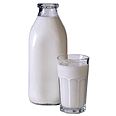
Tnuva fined NIS 55 million for silicone in milk scandal
Tel Aviv District Court inflicts multi-million shekel fine on food conglomerate for misleading public, regulatory authorities by adding silicon agents to 1% milk in 1995. Fine unreasonable, says company
The Tel Aviv District Court ordered Tnuva, Israel’s largest food conglomerate, to pay NIS 55 million (approx. $15.55 million) in damages to the consumers and plaintiffs affected by the infamous "Silicon in Milk" scandal.
Tnuva, said the court on Tuesday, deliberately misled both the consumers and the State regulatory authorities monitoring its actions.
The company was also ordered to pay NIS 150,000 ($42,600) to the heirs of Tawfiq Rabi, who filed the class action suit against the company back in 1995, and an additional NIS 250,000 ($70,720) to the Israel Consumers Association.
Case history
The silicon scandal first came to light in September of 1995, following a newspaper exposé which suggested that Tnuva was illegally adding dimethylsiloxane – a silicon derivative – to its UTH (long-life) skimmed milk.
Tnuva denied the allegations, going as far as publishing two full-page newspaper ads to the contrary. The Health Ministry took immediate action, issuing a consumers' advisory and ordering Tnuva to destroy all of the tainted milk.
Shortly after the affair was made public, a class action suit was filed by a milk consumer, Tawfiq Rabi, against the food conglomerate. The suit claimed that Tnuva's actions were in gross breach of the Consumers' Protection Act, and that it affected Rabi personally, as well as consumers in general.
Tnuva contested the suit classification as "class action," but once the Israel Consumers Association joined it, the Supreme Court granted the classification, sending both sides to resolve the case via mediation. The mediation failed, and the case was returned to court.
The final class action suit included 220,000 plaintiffs.
'Consumers far from indifferent'
"One cannot accept the company's claim that the consumers remained indifferent to the fact that silicon derivatives were added to their milk," said the court.
"The company was well aware of the implications this information would have on the public, and took measures to try and conceal it from the consumers, thus stripping them form their right to make a conscious, informed and educated choice.
"The company's actions constitute remunerable harm, even if there is no tangible evidence suggesting that consumers would have refrained form purchasing the company's milk, had they known of the infraction.
"Tnuva never obtained the dimethylsiloxane as a food additive, but rather as a purification agent which should never have found its way to milk, which is supposed to be the purest of products, free of any additives," noted the court.
"One cannot accept the company's claim that failing to disclose this information to the public was a trifle matter."

'Fine unreasonable'
"We are very pleased with the verdict," the plaintiffs' attorney, Iyad Rabi, told Ynet. "After a 13-year legal ordeal, the court has finally recognized that Tnuva's actions were in breach of consumer autonomy."
The verdict, said the Israel Consumers Association in a statement, "is a victory for the consumers. It asserts their rights to be fully informed about the products they purchase, as well as their right to make an informed decision."
Tnuva issued the following statement: "An initial review of the verdict suggests that the fine set by the court is both unreasonable and unprecedented.
"The events in question took place 13 years ago and have prompted Tnuva to undergo extensive reforms, which entailed replacing its entire upper management team, as well as reviewing its manufacturing process and replacing its quality control systems, which are up to the strictest international standards.
"Tnuva has also instated a direct consumers' information line and is implementing a policy advocating full transparency," concluded the statement. "The company must study the verdict further, before deciding on any future legal actions."
Distribution of funds
Tnuva, as said, wad ordered to pay $42,600 to the Rabi family and $70,720 to the Israel Consumers Association. The additional funds, said the court, are to be divided as followed:
- The company must utilize one third of the money to benefit the consumers, either by reducing product prices or enlarging milk containers without changing their pricing.
- A third of the money must be allotted to food, nutrition and public health research.
- A third of the funds must be put towards helping relief organizations distribute milk to populations in need.
Vered Luvitch and Yael Unger contributed to this report










